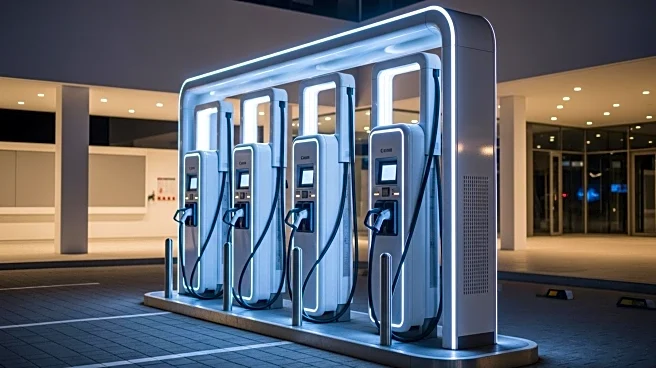What's Happening?
The European Union is standing firm on its 2035 target for all-electric vehicle sales despite pressure from automakers for leniency. At a recent auto summit, automakers requested a review of the target, citing challenges in meeting the deadline. The EU Commission has agreed to an early review but insists that the future of cars is electric. This decision comes amidst rising competition from Chinese electric vehicle exports, which have rapidly increased their market share in Europe. The EU had previously extended emissions compliance deadlines for automakers, but remains committed to its climate goals, aiming for a 55% reduction in CO2 emissions by 2030 and full climate neutrality by 2050.
Why It's Important?
The EU's firm stance on its electric vehicle targets is crucial for maintaining its leadership in climate policy and addressing global competition from Chinese automakers. European automakers face significant pressure to accelerate their transition to electric vehicles, as Chinese manufacturers continue to gain market share with advanced and affordable EVs. The EU's decision to uphold its targets could drive innovation and investment in the European automotive industry, ensuring it remains competitive in the global market. However, the resistance from automakers highlights the challenges of transitioning to sustainable transportation and the potential impact on jobs and industry dynamics.
What's Next?
The EU Commission will conduct an early review of its 2035 targets, potentially offering minor flexibility. Automakers and governments, such as Germany's CDU, are advocating for solutions that extend the lifespan of internal combustion engines. The review may consider exceptions for plug-in hybrid vehicles, despite concerns about their real-world emissions. The EU's decision will influence the pace of the EV transition and the strategies of European automakers in adapting to new market realities. The outcome of the review could have significant implications for the automotive industry's future and its role in addressing climate change.
Beyond the Headlines
The EU's decision to maintain its electric vehicle targets reflects broader ethical and environmental considerations. The transition to electric vehicles is essential for reducing emissions and combating climate change, which poses a significant threat to global ecosystems and human health. The automotive industry's resistance to change underscores the tension between economic interests and environmental responsibility. The EU's commitment to its targets may serve as a model for other regions, emphasizing the importance of bold action in addressing climate challenges and fostering sustainable development.










